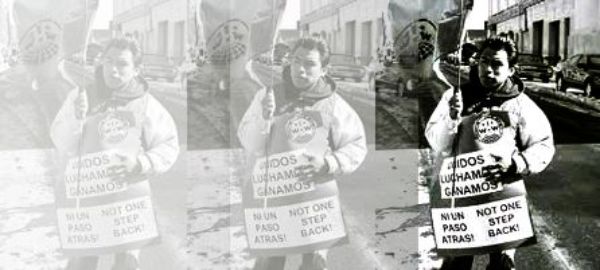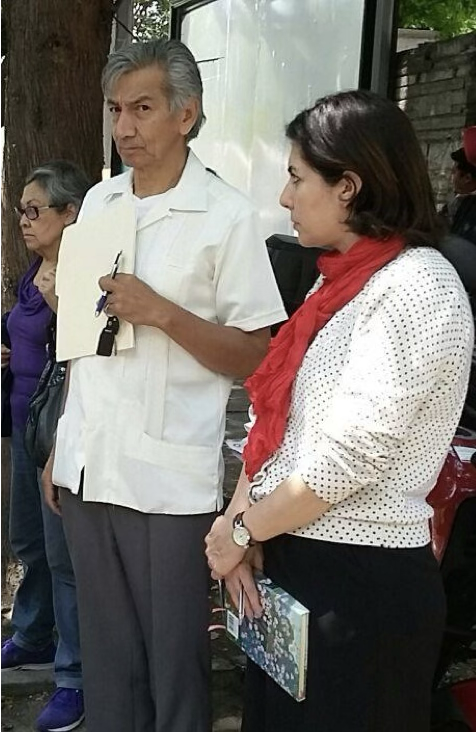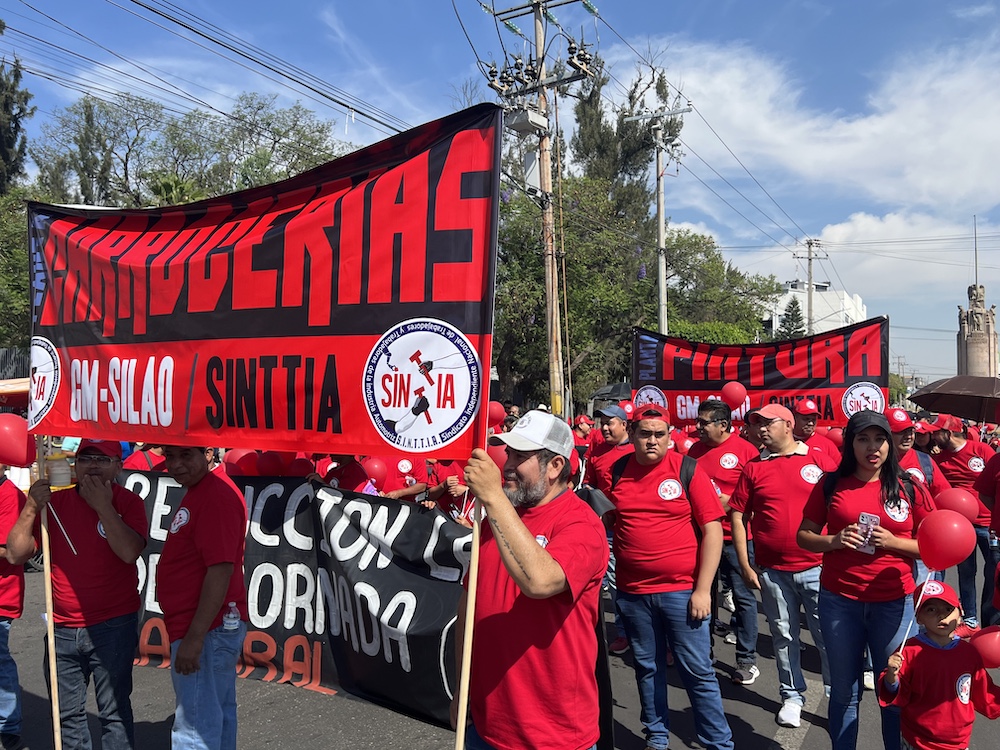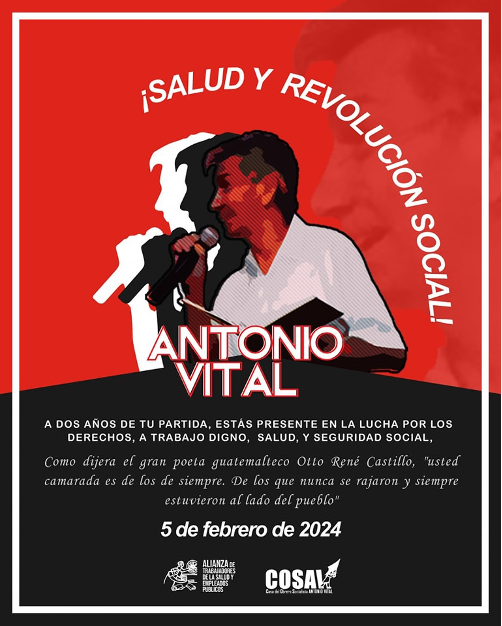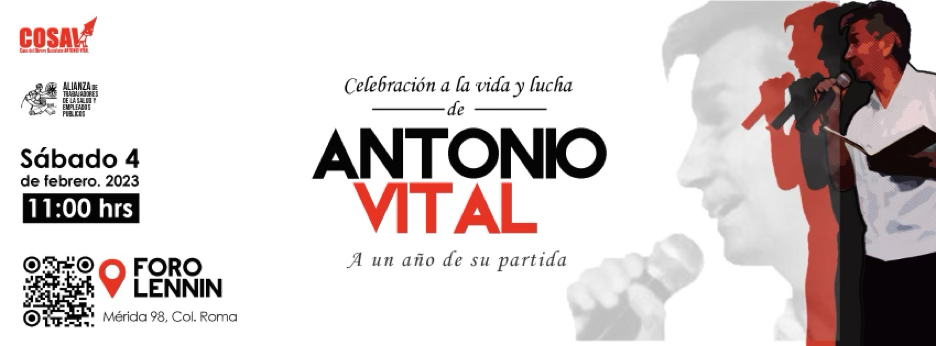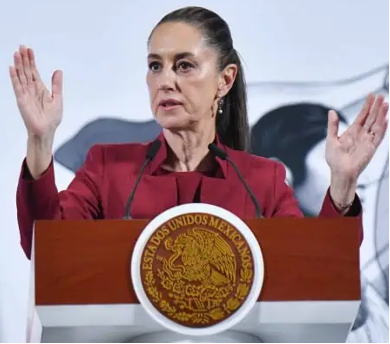|
|
The weekly newsletter of the Mexico Solidarity Project |
|
Every issue archived online at mexicosolidarityproject.org |
|
April 09, 2025 |
|
|
|
Always Together: Socialists and Unions |
|
Meizhu Lui, for the editorial team |
|
|
March for Immigrant Workers Rights, February 19, 2007. Photo courtesy of IWW and Make the Road by Walking. |
|
Like bread and butter, socialists and unions are always found together.
Socialists see that the world of political and economic power is upside down, and our job is to turn it right side up. Why should the criminals who ruthlessly grab the land and resources reap the rewards, when it’s workers who turn those raw materials into things of use and value? The union anthem “Solidarity Forever” says,
“They have taken untold millions that they never toiled to earn,
In the US, in the 1920s and 30s, those who led the union movement — the ones beaten up and gunned down by company thugs — were Communists. But in the late 1940s and early 50s, with the paranoia and repression of the Red Scare, the Congress of Industrial Unions expelled unions with “red” leadership, and union membership and militancy went down.
Mexico was less scared of Reds from across the ocean, given their experience with the imperialists next door. However, workers were stymied by the PRI government, which appointed union bureaucrats to oversee fake unions that had no worker involvement. It was socialists who challenged this absurdity and rallied workers to fight back, to flood the public squares, block the public roadways and shut down workplaces.
Antonio Vital was one such unrelenting socialist leader. When he died, the workers center Casa del Obrero Socialista Antonio Vital was founded in his honor and to continue his work, as Hortensia Escobar tells us.
Today, in both Mexico and the US, new shoots of worker militancy are sprouting. And in both places, socialists often lead. Socialists and unions. The two still go together like bread and butter. Yes, “we can bring to birth a new world from the ashes of the old, for the union makes us strong!” |
|
|
A Socialist Workers Center Builds Worker Power |
|
Hortensia Escobar Hernández is a Mexican economist and UNAM graduate. She’s a strong advocate for public and popular education, especially for indigenous communities. Being a Marxist positions her for the fight for labor rights, articulating strategies to make Mexican unionism truly representative. As events coordinator for the Antonio Vital Socialist Workers' House, or COSAV, Hortensia organizes meetings and events that promote solidarity, self-management and the defense of working-class rights. |
|
|
Who was Antonio Vital, and what was his role in workers movements?
In the 1970s, the government’s neoliberal attack on the public sector inspired an upsurge of worker revolts in Mexico. |
|
In that era, Antonio Vital became a health sector union leader. He had a medical degree and worked as a public health statistician at the General Hospital of Mexico. Because it was a public hospital under the Ministry of Health, Vital was automatically a member of a union. In Mexico, doctors are in unions too.
The union went on strike in 1978, and he was among the leaders. The government brutally repressed and broke the strike, imprisoning and torturing Vital and six other leaders, including two women. But Vital continued his defense of workers, including those beyond the health sector, and initiated militant rallies on many occasions. |
|
|
Antonio Vital: Photo from COSAV |
|
In the early 2000s, during Vicente Fox’s conservative PAN government, Vital denounced its neoliberal policies that were destroying the public programs so many people depended on. To strengthen public workers, he created the Alliance of Health Workers and Public Employees. In particular, he became known throughout Latin America for his fight to improve Social Security benefits for Mexico’s public employees.
|
|
What were the specific issues for public sector workers?
The Social Security administrations in Mexico — and there are three —cover not just pensions as in the US, but also medical benefits. Federal workers receive benefits from the National Institute of Social Security, or ISSTE, and private sector workers from the Mexican Social Security Institute, or IMSS. A completely different agency provides benefits to the state-owned oil company PEMEX.
First, Vital and others demanded that wages and benefits across the three social security systems be made consistent, with federal workers getting the same benefits as the other sectors. Second, they demanded democracy in their unions. As with most unions created by the PRI, these public-sector unions were often corrupt and allied with the repressive government.
Third, “social security" also includes housing and provides loans for workers to purchase homes. But the interest rates were high, with heavy fines for falling behind. Fines were collected by extending the loans over longer periods of time or deducting from paychecks. Many workers took home only 20% of their income! Even today, many people are stuck with those debts that are impossible to pay off.
Did the new labor law of 2019 give more space to organize democratic unions?
The new Morena government passed the labor law with good intentions, but it’s almost impossible to implement. Since the repression of the 1970s, labor has become bureaucratic and precarious. Having to worry about their own family’s survival, workers have lost class consciousness.
Workers have to understand that they, not employers, create the wealth and deserve to enjoy its benefits. They must unlearn the neoliberal lies instilled in them over many years — that capitalists at the top deserve exorbitant wages and that they will use their wealth to provide jobs and income to the rest of society.
Other obstacles also make change difficult. The unions are constructed vertically, with national leaders at the top, rank and file at the bottom — and no intermediate structures for workers to learn how to operate democratically and effectively.
An example of the difficulties is my experience in 2019 at the National Autonomous University of Mexico, or UNAM, in Mexico City, where I taught. The new law required that all existing contracts had to be approved by a vote of the union members. But a “white” union, a bosses' association run by a small mafia, controlled the teachers' contract.
They spread false information before the vote, the election had no independent observers, and that same mafia organized the election. No wonder we lost! The lousy contract was ratified. |
|
|
GM workers in Silao Guanajuato were among the first workers to successfully oust a corrupt union under the 2019 law. Photo: Bruce Hobson |
|
I believe the Morena government didn’t listen to workers as workers. We’ve seen other advances for low-income people, but it didn’t recognize workers organizations or fully defend workers’ right to organize.
Is that the reason that Casa del Obrero Socialista Antonio Vital, or COSAV, was founded? What do you do? |
|
In 2022, three years after Vital's death, we founded COSAV in his honor. Workers centers like COSAV give vital assistance to unions, since most workers have little experience with organizing. I'm not only promoting COSAV, but also centers organized by CILAS, such as the Casa Obrera del Bajío, the Micelio Rojo center and a few others -- far too few!
COSAV is located in the heart of Mexico City. We provide legal advice and connect workers to government services. We provide political education through workshops and film screenings with discussion afterward. |
|
|
|
COSAV FB: celebration of the 1st anniversary of Vital’s death |
|
We also do research to develop materials for union campaigns. For example, when the Metropolitan Autonomous University or UAM union went on strike, we analyzed UAM's finances and designed a flyer to distribute. |
|
Worker centers are also the places where worker struggles are documented and that history is preserved so that future generations understand what it took to win workers’ rights. COSAV has a workers’ museum in its future plans.
Do you see change with the Claudia Sheinbaum government?
At first, no. On February 7, Claudia proposed a reform to the ISSTE that would charge more for health insurance to workers earning a monthly income of 35,000 pesos. They also proposed that federal entities would have to pay higher premiums per worker. The teachers took to the streets! While there, they demanded the repeal of the 2007 law that privatized pensions.
Claudia responded quickly and positively. On March 18, she withdrew her February 7 proposal and froze the retirement age at 56 for women and 58 for men. She did not repeal the 2007 law, saying that would require significant budgetary resources that were not available.
Regarding those impossible to repay mortgage loans with huge penalties, she promised to forgive some debtors and reduce payments so that workers wouldn't be impoverished. She promised to discuss, school by school, wages, promotions and the right to organize. At long last, some of the issues Antonio Vital raised back in 1978 are being resolved!
As class consciousness grows, I’m confident that socialists can again be at the forefront of a renewed labor movement. When workers realize that, as a class, they have the strength to end capitalist exploitation, they can transform society. |
|
|
|
|
Sheinbaum on Tariffs |
|
On April 3, President Claudia Sheinbaum responded to Trump’s April 2 announcement on tariffs. Mexico largely dodged the bullet, although tariffs on non-USMCA products will rise. Unlike most other countries, she did not threaten retaliatory tariffs, but instead maintained a respectful attitude and the desire to work together. Most importantly, her response was to strengthen Mexico’s own internal economy. On April 4, she laid out the plan to achieve food sovereignty. |
|
|
This press release was edited for clarity and brevity. Mexico City, April 3, 2025 |
|
"Today, it is very important to point out that Mexico is respected by the United States and by the entire world. And this relationship of respect that we have managed to build with President Trump, which is related to our frank dialogue of collaboration and coordination, has allowed us today to have a preferential status in relation to other countries,” Sheinbaum explained in the morning presidential press conference known as the mañanera. Claudia explained, “In the case of Mexico, there will be no additional tariffs . . . And this also has to do with the strength of our government. As I always say, there’s a strong people in Mexico, that is the strength of our country, this is why there is no division between the people and the government.” President Sheinbaum pointed out that the Mexican Government will continue to collaborate and coordinate with the United States, particularly on security and immigration questions, within the framework of respect for the sovereignty of both nations. The President reported that, according to what was issued yesterday by the White House, the agreement reached with President Trump on March 6 was respected, in which the products within the treaty between Mexico, the United States and Canada (USMCA) enter the US market tariff-free. That means that companies wishing to export without paying tariffs must adhere to the USMCA clauses, which require a certificate of origin, and which means that the products or their content must be mostly produced in Mexico. Secondly, “What was issued for Mexico and Canada: 'For automobiles qualifying for preferential tariff treatment under the USMCA, importers of such automobiles may submit documentation to the Secretary of Commerce that specifies the amount of U.S. content in each model imported into the United States.' In other words, what they are saying is that the part that was manufactured in the United States will be discounted,” she explained in reference to the executive order issued by the US President on March 26. President Sheinbaum emphasized that in addition to continuing dialogue with the United States, Plan Mexico will also be accelerated to strengthen the national economy. “We have a plan. So, the plan to strengthen the national economy and the wellbeing of the people of Mexico is a plan that we have been developing, and it has to do with Plan Mexico. In any case, we are going to accelerate many of the actions of Plan Mexico,” she said. |
|
Don’t miss an issue! Sign up for a free Mexico Solidarity Bulletin subscription.
For a deeper dive into current news and analysis in English, check out our media website and the podcast ¡Soberanía! (Sovereignty) with José Luis Granados Ceja and Kurt Hackbarth. Sin Muros is a weekly program dedicated to analyzing the Mexico-US relationship, reporting news, analysis and research from both sides of the border. |
|
|
Recent news reports and commentaries, from progressive and mainstream media, |
|
David Adler, Vanessa Romero Rocha, and Michael Galant The Fourth Transformation Phenomenal World. “Con el pueblo todo; sin el pueblo, nada,” from this vantage point, is a strategy as much as it is a slogan: building and sustaining popular support, for Morena, is the only way to achieve a true and enduring transformation. As Mexico stares down the barrel of Trump’s bid for pan-American dominance, the strongest test for that strategy may yet lie ahead.
Kurt Hackbarth, Assessing AMLO: The Presidential Years Jacobin. “AMLO taught us to respect ourselves again,” said a street bookseller on inauguration day. “And to hell what they think of us abroad!”
Samanta Escobar, Decisión de Trump sobre aranceles a México, una segunda oportunidad para el nearshoring El Economista. “Uno de los principales factores que las empresas consideran en el momento de invertir es la certeza y, en este momento, es complejo. Van a esperar a ver qué pasa y cómo queda todo acomodado. Pero, en términos de nearshoring y a la luz de lo que se anunció ayer, México está otra vez frente a una oportunidad histórica para organizar las cadenas de suministro.”
Sheinbaum and Carney Pledge to Keep the Mexico-Canada Trade Relationship Telesur English. Carney’s contact with Mexico comes very late, as the Liberal Party of Canada, first under Trudeau and now under Carney, were more interested in talking trade with the European Union and the UK, Australia and New Zealand, than allying with Mexico in any substantive manner.
Josefina Quintero, Suspende alcaldía MH actividades del domingo del festival Axe Ceremonia La Jornada. Tras el incidente en el parque Bicentenario que cobró la vida de dos personas, la alcaldía Miguel Hidalgo determinó suspender las actividades del domingo en el festival Axe Ceremonia 2025, que se realizaba desde la tarde de este sábado, hasta que se esclarezca lo ocurrido.
Katie Bo Lillis, Natasha Bertrand and Zachary Cohen CIA is reviewing its authorities to use lethal force against drug cartels CNN. Among the issues agency lawyers are examining is the CIA’s and its officers’ liability if an American is accidentally killed in any operation. No such concern for Mexicans, of course.
Manuel Gonzalez, El desafuero que no llega Sin Embargo. El dirigente priista Alejandro Moreno Cárdenas, hoy Senador con fuero, aún enfrenta acusaciones de varios delitos y es investigado por la FGR y por la Fiscalía de Campeche por su pasado en aquella entidad.
Fabiola Sánchez, US tariffs ripple through auto supply chains into Mexico Associated Press. José Emilio, a 31-year-old worker at the Toluca plant who gave only his first names for fear of retaliation, said he was worried as he headed in for his shift. He said he heard about the company’s plans to pause production on the news and worried that the U.S. tariffs could lead to job loss in Mexico.
“No fue el incendio, fue el Estado”: a dos años del incendio impune en la estación migratoria de Ciudad Juárez Desinformémonos. El comisionado del Instituto Nacional de Migración (INM), Francisco Garduño, anunció que ofrecerá una disculpa pública por siniestro el próximo 16 de abril, sin embargo, negó que se hayan cometido malos tratos contra los migrantes y los familiares de las víctimas, como han denunciado desde el incendio. |
|
|
|
|
The Mexico Solidarity Project brings together activists from various socialist and left organizations and individuals committed to worker and global justice. We see the 2018 election of Andrés Manuel López Obrador as president of Mexico as a watershed moment. AMLO and his progressive Morena party aim to end generations of corruption, impoverishment, and subservience to US interests. Our Project supports not just Morena, but all Mexicans struggling for basic rights, and opposes US efforts to undermine organizing and Mexico’s national sovereignty.
Editorial committee: Meizhu Lui, Bruce Hobson, Agatha Hinman, Victoria Hamlin, Courtney Childs, Pedro Gellert. To give feedback or get involved yourself, please email us! |
|
Subscribe! Get the Mexico Solidarity Bulletin in your email box every week. |
|
Web page and application support for the Mexico Solidarity Project from NOVA Web Development, a democratically run, worker-owned and operated cooperative focused on developing free software tools for progressive organizations. |

